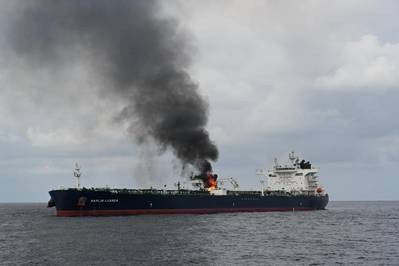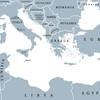Who Are Yemen's Houthis and Why Are They Attacking Ships in the Red Sea?
Yemen's Houthis have been attacking ships in the Red Sea since November, in what they say is a campaign of solidarity with Palestinians during the Israel-Hamas war in Gaza, prompting retaliatory U.S. and U.K. strikes against the Iran-aligned group.
In the first fatalities reported since the Houthis began their attacks on shipping in one of the world's busiest trade lanes, a Houthi missile on Wednesday killed three seafarers on the Greek-owned, Barbados-flagged ship True Confidence some 50 nautical miles from Yemen's port of Aden.
History
In the late 1990s, the Houthi family in the far north of Yemen set up a religious revival movement for the Zaydi sect of Shi'ite Islam, which had once ruled Yemen but whose northern heartland had became impoverished and marginalized.
As friction with the government in the capital Sanaa grew, they fought a series of guerrilla wars with the national army and a brief border conflict with Sunni Muslim Saudi Arabia.
War in Yemen
A civil war erupted in Yemen in late 2014 when the Houthis seized Sanaa. Worried by the growing influence of Shi'ite Iran along its border, Saudi Arabia intervened at the head of a Western-backed coalition in March 2015 in support of the Saudi-backed government.
The Houthis established control over much of the north and other large population centers, while the internationally recognized government based itself in the port city of Aden.
Yemen has now enjoyed more than a year of relative calm amid a U.N.-led peace push. Saudi Arabia has been holding talks with the Houthis in a bid to exit the war but a sharp escalation in regional tensions since the start of the Gaza war has increased risks of a new conflict between the militia and Riyadh.
What is the aim of the Houthi attacks in Red Sea?
The Houthis say their attacks on shipping routes in the Red Sea are a show of support for the Palestinians and Hamas, the Islamist group that controls Gaza, in its war against Israel.
The Houthi attacks have disrupted global shipping, forcing firms to re-route to longer and more expensive journeys around southern Africa. The cost of insuring a seven-day voyage through the Red Sea has risen by hundreds of thousands of dollars.
The increase in delivery costs has stoked fears of a fresh bout of global inflation.
While the militia has said it attacks only vessels with links to Israel, the United States and Britain, shipping industry sources say all ships could be at risk.
The Israeli resort city of Eilat on the Red Sea has also been a target for attacks by the Houthis.
The U.S. and Britain have cast their retaliatory air strikes against the Houthis as part of international efforts to restore the free flow of trade in a key route between Europe and Asia that accounts for about 15% of the world's shipping traffic.
The Houthis have said they will only consider ending their missile and drone attacks on international shipping in the Red Sea when Israel ends its "aggression" in the Gaza Strip.
What are the Houthis' links with Iran?
The Houthis are one part of what has been called the "Axis of Resistance" - an anti-Israel and anti-Western alliance of regional militias (Hamas, Hezbollah and Houthis) backed by Iran.
The Houthis' slogan is "Death to America, Death to Israel, curse the Jews and victory to Islam".
Despite the Houthis' ties with Iran, it is not clear how deep their relationship goes. The Saudi-led coalition accuses Iran of arming and training the Houthis, a charge both deny. The coalition also says Lebanon's Iran-backed Hezbollah is helping the Houthis, an accusation it rejects.
While Iran champions the Houthis as part of its regional "axis of resistance", Yemen experts say they are motivated primarily by a domestic agenda, though they share a political affinity for Iran and Hezbollah. The Houthis deny being puppets of Iran and say they are fighting a corrupt system.
(Reuters - Editing by Michael Georgy and Gareth Jones)












